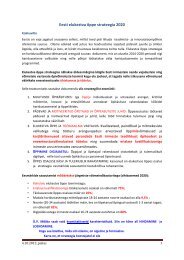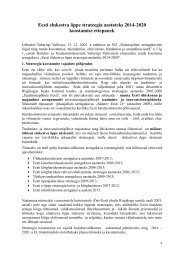Estonian Human Development Report
Estonian Human Development Report - Eesti Koostöö Kogu
Estonian Human Development Report - Eesti Koostöö Kogu
You also want an ePaper? Increase the reach of your titles
YUMPU automatically turns print PDFs into web optimized ePapers that Google loves.
a large part of the supportive and regulatory influence is<br />
related to the public sector, is enforced by the state and<br />
uses tax resources.<br />
The private and public sector and the supportive,<br />
regulatory and compensatory fields of governance are<br />
integrated and their differentiation into the aforementioned<br />
models helps to define the particularities of the<br />
policies of various fields of activity, while also simplifying<br />
their actual character. After all, the same policy can<br />
be related to various governance models, for example,<br />
in addition to a supportive role, education and research<br />
policy also has a regulatory and somewhat compensatory<br />
role; in addition to compensation, health care<br />
policy can be used to support certain options, etc. At<br />
the same time, one governance aspect can be considered<br />
to be more important in the case of any policy. For<br />
instance, with regard to education, the supportive aspect<br />
of governance is emphasized, although education also<br />
includes regulatory and compensatory aspects to a certain<br />
extent. Health care policies also have an important<br />
supportive aspect, especially in the case of various preventive<br />
programs. In other spheres of social policy, the<br />
compensatory aspect is most important and some regulatory<br />
aspects are added.<br />
Voluntary agreements, companies’ social responsibility<br />
and pressure group activities are the most direct<br />
reflection of the population’s intervention in shaping<br />
its living and working conditions. Informal associations<br />
and the development of the non-profit sector, are<br />
related to both the better and more specific definition<br />
of the various interests of the citizens as well as to the<br />
general development of democracy. The development of<br />
these associations and active participation in influencing<br />
various processes reflects the general organizational<br />
abilities of the society members as well as the political<br />
process in relation to the perception and protection of<br />
interests.<br />
Ideology also plays an important role in shaping the<br />
character of policies, if only to determine how great or<br />
small the role of the state should be in a specific field. This<br />
determines the extent to which one or another policy is<br />
implemented. At the same time, policies remain in the<br />
public sphere in any case, where it is possible to distinguish<br />
the measures designed at the local, national and EU<br />
levels and their impact on each other.<br />
Enforcement and monitoring mechanisms are important<br />
to the governance models and the policies related<br />
thereto. In the case of education, health care and social<br />
protection, the primary role is played by the national and<br />
local governments. The companies’ social responsibility<br />
and various agreements reflecting societal interests<br />
are voluntary and their violators are faced primarily with<br />
moral condemnation. It is worth emphasizing that the latter<br />
can apply very strong pressure. At the same time, crisis<br />
situations test various regulations and it is easier to withdraw<br />
from voluntary agreements than from regulations<br />
supported by government enforcement.<br />
Summary<br />
In Estonia the extensional development of the economy,<br />
where economic growth has been primarily based on a<br />
simple manufacturing base, has been gradually supplemented<br />
by activities that need more human and social<br />
Table 6.3.1. Models and fields of governance<br />
Governance<br />
model<br />
Supportive<br />
Regulatory<br />
Compensatory<br />
Public<br />
Field of activity<br />
Property rights<br />
Business laws<br />
Competition policy<br />
Education and research policy<br />
Labour laws<br />
Regulations related to the<br />
natural environment<br />
Health and safety measures<br />
Social insurance<br />
(In-service) training and<br />
retraining programs<br />
Health care policies<br />
Source: Gereffi, Humphrey and Sturgeon, 2003.<br />
Private<br />
Market ideology<br />
Specialized standards and<br />
practices<br />
Voluntary agreements<br />
Companies’ social<br />
responsibility<br />
Pressure group activity and<br />
consumer boycotts<br />
Collective contracts<br />
Philanthropy<br />
capital. On the one hand, the level of economic development<br />
is determined by the extent of resources that can be<br />
placed in the social sphere. On the other hand, a critical<br />
component is the human and social capital that is created<br />
by the social sphere, and which determines what type of<br />
economic development is possible.<br />
Since economic growth is related to savings and<br />
investments, this also means postponing consumption,<br />
for instance, taking home loans now that must<br />
be repaid in the future at the expense of consumption.<br />
When taking such risks related to the future, confidence<br />
in the governmental institutions is important. Moreover,<br />
guarantees are also important so that the benefits<br />
derived from economic growth are distributed to all citizens.<br />
This is guaranteed by the social policies in various<br />
fields of activity.<br />
These types of guarantees are especially important in<br />
countries with diverse ethnic compositions, like Estonia.<br />
The diverse ethnic and religious composition of a country’s<br />
population usually increases the cost of coordinating<br />
economic and social policies, since there are more points<br />
of departure and applications in this case than in countries<br />
with homogeneous ethnic and religious populations<br />
(La Porta et.al., 1998).<br />
The connection of social and economic viewpoints to<br />
human development and the assessment of corresponding<br />
policies and governance models must be based on mutual<br />
connections as well as significant differences. Economies<br />
based on private ownership and profits cannot be subordinated<br />
to the social needs, in order to establish rules that<br />
are primarily and principally based on the social dimension.<br />
At the same time human development, of which economic<br />
activity is an important part, is related to the social<br />
aspects of societal organization.<br />
One of the reasons for a divergence in economic and<br />
social policy lies in the difference in time ranges. Sociopolitical<br />
measures develop the population’s potential during<br />
a longer period, and therefore, the payment of expenditures<br />
takes time. For instance, general literacy assumes<br />
the long-term functioning of the school system and the<br />
involvement of the entire cohort of children of a corresponding<br />
age in the education system for decades. The use,<br />
not to mention development, of modern technology is not<br />
possible without education.<br />
With regard to Estonia’s choices, this signifies the<br />
need to concentrate the scarce resources made availa-<br />
137 |















